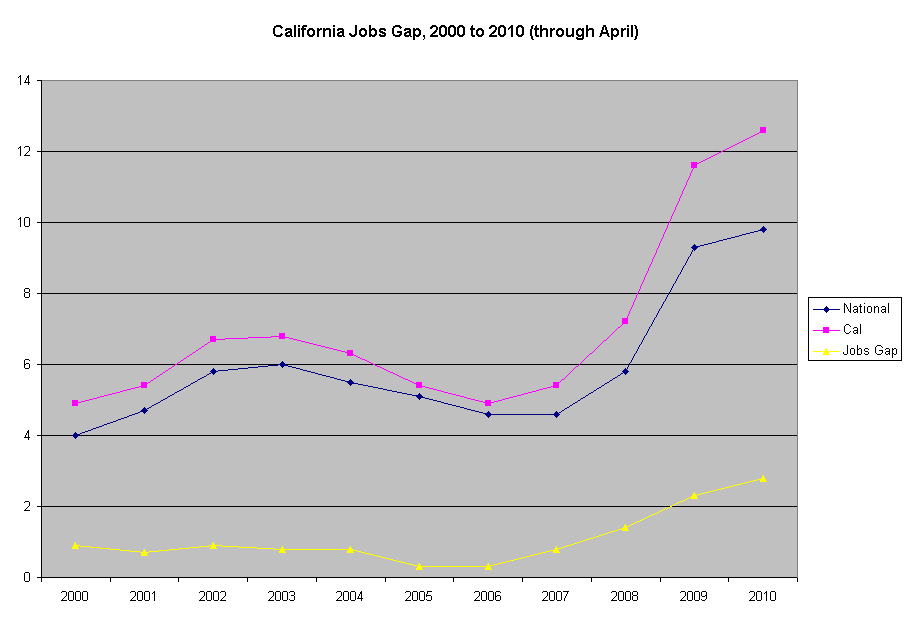Cal Jobs Gap widens in 2010

MAY 24, 2010
By JOHN SEILER
Instead of bashing one another for past liberal postures, Meg Whitman and Steve Poizner should be talking about the California Jobs Gap. Jerry Brown should be, too.
There’s no more important issue today, especially with the primary election now just two weeks away, on June 8, and the state budget due a week later on June 15
Back in January, I devised the “California Jobs Gap” to measure how much worse California’s unemployment rate was than the rest of America. It filtered out the “noise” of general unemployment across America, which has risen for almost three years.
That left just what California unemployment did compared to the rest of America, highlighting state policies’ effects on jobs just in our state.
I wrote a follow-up a couple of weeks later, noting that the Jobs Gap was growing. But the two analyses did not yet include data for 2010, which was just starting.
Now we have data for the first four months of 2010, January to April. The news is just bad. The gap has kept growing.
The Jobs Gap is shown most dramatically in the following chart. Notice the yellow line at the bottom: The California Jobs Gap.

As you can see, the Jobs Gap was a relatively low 0.3 percentage points as recently as 2006. Accounting for statistical error, it basically was at the national average.
Then the Jobs Gap edged up to 0.8 percentage points in 2007, a bad sign in that year of waning prosperity, with the Great Recession beginning in December.
Then the number shot up, to 1.4 percentage points in 2008 and 2.3 percentage points in 2009.
Upward surge continues
In 2010, so far the Jobs Gap’s upward surge has not stopped. For the first four months of 2010, January through April, the Jobs Gap averaged 2.8 percentage points. That’s the highest ever.
Put another way, as compared with the rest of America, California’s unemployment rate – its Jobs Gap – is in the worst shape it’s ever been in.
In my past articles, I noted that the likely cause of the Jobs Gap was the state’s strong anti-business attitude. In particular, in 2006 Gov. Arnold Schwarzenegger signed into law AB32, the global-warming bill that mandates draconian cuts in greenhouse gas emissions of 25 percent by 2020.
Studies conflict on whether AB32 would create or kill jobs. And the California Jobs Initiative will be on the November ballot to suspend AB32 until unemployment drops to 5.5 percent for four consecutive quarters.
What’s curious is that the opponents of the initiative, StopDirtyEnergyProp.com, don’t emphasize the overall jobs situation, but only say, as the front page of their Web page says today, “The Texas Oil Companies’ Dirty Energy Proposition will allow polluters to avoid our state’s clean energy standards, kill competition and jobs from California’s emerging clean technology companies, and keep us addicted to dirty, costly oil.”
The continued spike upward in the Jobs Gap also seems to be connected to the record February 2009 record tax increase of $13 billion that Gov. Schwarzenegger signed into law.
Checking the theory
Any theory should have a “falsification” element, a way to prove it wrong by testing. The Jobs Gap has two such tests coming up. The 2009 tax increases expire in 2011. So, in January, we should see the Jobs Gap start shrinking.
And should the California Jobs Initiative pass in November and effectively kill AB32, the Jobs Gap likewise should start shrinking. Also, even if the initiative fails, the next governor – Brown, Poizner or Whitman – will have the power to suspend AB 32 for a year. If the new governor announces that suspension right after election, or upon taking office in January, then doing so also could reduce the Jobs Gap.
On the other hand, if such events occur and the Jobs Gap remains high, then either another explanation of the Jobs Gap will be needed, or it’s just plain wrong.
In the future, yet another factor to be taken into account in my Jobs Gap calculations might be the burgeoning government-worker pension crisis. The most shocking news came in April, too early to affect state jobless numbers. A Stanford University study found that the state pension shortage is $500 billion, many times higher than earlier estimates.
That may be a festering wound on the state economy until it’s dealt with. In a May 21, 2010 column in the online New York Times (scroll down for his contribution), my colleague Steven Greenhut writes that the only way the pension crisis will be dealt with is by initiative. The Legislature just refuses to do its job, which as a first priority is supposed to be making sure the state budget doesn’t go broke from excessive pensions or anything else.
However, so many states have pension crises that California’s problem may not be unique enough to affect the Jobs Gap, which is designed to put a number on uniquely California pressures affecting jobs.
In California, we know we’re special. But the Jobs Gap is one area where it’s better to be ordinary.
John Seiler, an editorial writer with The Orange County Register for 19 years, is a reporter and analyst for CalWatchDog.com. His email: writejohnseiler@gmail.com.
Related Articles
California on the Peso Standard?
MAY 9, 2011 By JOHN SEILER Californians keep looking for ways to boost our economy, which also would bring in
The Real Meaning of the Constitution
By JOHN SEILER Writing recently in the Sacramento Bee, two professors mangled the actual meaning of the U.S. Constitution. Alan
Hoover analyst: CA already met 50% renewable goal
Eureka! California already surpassed Gov. Jerry Brown’s 50 percent goal for renewable energy power by 2030. It did so, in



